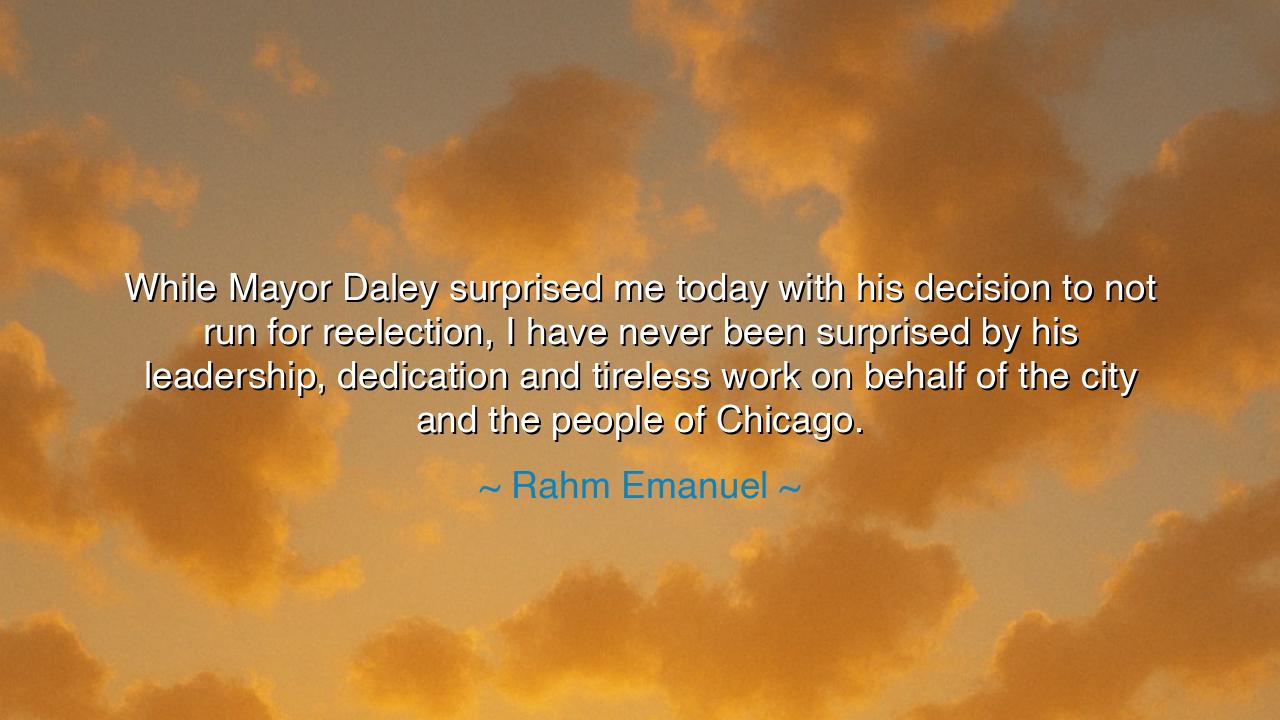
While Mayor Daley surprised me today with his decision to not run
While Mayor Daley surprised me today with his decision to not run for reelection, I have never been surprised by his leadership, dedication and tireless work on behalf of the city and the people of Chicago.






When Rahm Emanuel said, “While Mayor Daley surprised me today with his decision to not run for reelection, I have never been surprised by his leadership, dedication and tireless work on behalf of the city and the people of Chicago,” he was not merely offering a political statement — he was speaking of constancy, service, and the noble virtue of steadfast leadership. In these words lies the recognition of a man who has given his life not to the fleeting passions of ambition, but to the enduring labor of stewardship. Emanuel’s statement reflects an ancient truth: that while the actions of the great may sometimes astonish us, their character should not, for it is already known by the fruits of their devotion.
Mayor Richard M. Daley, the son of another legendary leader, governed the city of Chicago for over two decades. In that time, he shaped its skyline, restored its parks, and guarded its civic soul through storms of politics and change. His decision to step down was, indeed, a surprise — the end of an era. Yet, as Emanuel expressed, it was a surprise only of circumstance, not of substance. For the true measure of Daley was already written in the rhythm of his years: his dedication, his labor, his faithfulness to the people he served. In his leaving, there was not abandonment, but completion — a return to rest after long and noble toil.
The ancients would have called such a man a keeper of the polis, one who lives for the harmony and order of the city. Like Pericles of Athens, whose eloquence and vision guided his people through war and rebuilding, Daley’s rule was not without controversy, but it was rooted in a belief that a city is a living organism — its buildings are its bones, its people its breath, and its leaders its heart. When the heart beats strongly, the body thrives; when it falters, all suffers. Emanuel’s praise thus echoes the gratitude of citizens throughout history for those few who understand leadership not as power, but as burden carried with honor.
There is also in Emanuel’s words a reflection on continuity and surprise — how even the familiar can still teach us humility. He admits surprise at Daley’s decision, but none at his virtues. This reveals a deeper lesson: that while fate changes swiftly, character endures. The deeds of the steadfast may not always be glamorous, but they are enduring, like the quiet builders of Rome who laid stones that would outlast empires. The wise do not marvel at the end of a chapter, but at the constancy of the hand that wrote it.
Let us also see in this quote a reminder of the sacred duty of leadership. The leader is not born to be praised, but to serve. When his time comes to step away, the city should not mourn the loss of a ruler, but rejoice in the example he leaves behind. As with Cincinnatus, who returned to his farm after saving Rome, there is greatness in knowing when one’s work is complete. The withdrawal of a true leader is never a retreat, but an offering — a chance for others to rise, guided by the light he has left burning.
The emotional heart of Emanuel’s tribute lies in his recognition of tireless work — the unseen sacrifices that define real leadership. The late nights, the difficult decisions, the unending tension between public expectation and personal cost — these forge a leader’s spirit. It is easy to praise success; it is harder to see the labor beneath it. By saying he was never surprised by Daley’s work, Emanuel honors that invisible struggle — the noble endurance that transforms duty into legacy.
From this reflection, we may draw a timeless lesson: true greatness is not sudden, but cumulative. It is not measured by single triumphs, but by years of constancy and faith. Whether one leads a city, a household, or a humble trade, the call is the same — to labor with integrity, to serve without vanity, and to finish one’s course with grace. When your time to depart arrives, let it be said of you, as Emanuel said of Daley: “We were surprised by your leaving, but never by your dedication.”
For in the end, the highest praise one can earn is not astonishment, but trust — the trust that one’s deeds, though human, have touched eternity.






AAdministratorAdministrator
Welcome, honored guests. Please leave a comment, we will respond soon